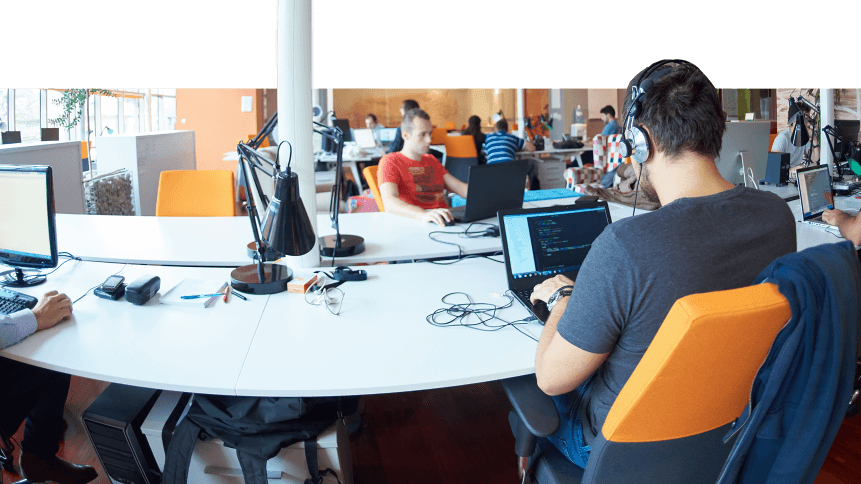Taking a data-driven approach to startup growth

Think of a startup incubator, and you’ll generally think of the de facto model; an organization that fosters the growth of a fledgling business through management training and, perhaps more often than not, a chunk of office space.
Given its longevity, it’s hard to argue with the success of that model. In the US, the concept can be traced back as far as 1959 with the Batavia Industrial Center– a former New York poultry farm that, seeking to fill vacant space, was transformed as a hub for businesses to set up shop, enjoy secretarial services and receive sound business advice all under one roof.
Those fundamental principles have gone largely unchanged, but for James Parton, Managing Director of The Bradfield Centre, and former MD of cloud leader Twilio, the incubator model has become ripe for disruption.
“There are some fantastic accelerator, incubator and business school programmes available. However, many of these are starting to suffer from an over-reliance on ‘I did it my way’ mentorship, matching an entrepreneur who found success years ago with startups who operate in a vastly different business landscape,” Parton told TechHQ.
“Coaching provides a useful exchange of ideas, but it’s ultimately one person imparting their specific experience, and so much depends on whether the startup founder gels with the mentor.”
Last week, Parton launched his own iteration of the modern startup incubator, The Central Working Academy (CWA). Based at The Bradfield Centre, co-working space Central Working’s £20m deep tech hub, and launched in partnership with Trinity College Cambridge and the Department for Business, Energy and Industrial Strategy, the aim is to not grow startups through second-hand experience, but through data.
While data plays a key part of many startups today– applied to optimize their marketing, for one– it’s “strangely absent” from many of the support programs they enroll on, says Parton. And this can often be linked to discussions with mentors who may or may not ‘get’ the business.
“These programmes represent an analog solution in a digital world, and it’s high time that startup support became just as innovative as the companies it aims to assist.”
To this end, CWA will work with growth specialist Cartezia throughout an initial 12-month pilot, seeking to provide its membered startups with a personalized route to scale. The pair will deploy a purpose-built online platform that will analyze and diagnose each company’s current maturity, assessing factors such as current tech development, access to funding and customer profiling.
This information will then be used to forecast the company’s potential to scale over the next 12 month and provide step-by-step advice on how to reach that target. That will include specific recommendations on talent and funding acquisition, required improvements to commercial strategy and advised tweaks to a startup’s business model.
“The platform’s dataset has been compiled over 20 years, aggregating the experiences of more than 1,000 companies,” said Parton.
“This means Academy participants can map specific scenarios and gauge how specific steps would impact their growth trajectory, based on the aggregated experiences of other similar businesses.”
Taking this data-heavy approach, however, doesn’t mean the CWA sees no value in mentorship ‘from the horse’s mouth’. Insights from the platform will be supplemented by “intensive” full-day sessions with coaches, and regular mini sessions.
In launching CWA, the initiative seeks to attract high-growth tech companies, in particular, with Parton telling TechHQ that the companies set to benefit most are those that have already built momentum– with some capital already gathering and teams of 10 or more.
“We’re largely sector agnostic, but we anticipate that the most effective results will be seen from companies specializing machine learning, VR and AR fields,” he adds.
YOU MIGHT LIKE

How startups can use smart tech to scale
This launch forms just the pilot stage of a much loftier plan– the CWA will be seeking to establish new programs across the UK in the year ahead, “alongside global investment networks and corporate partners”.
“Our end goal is to roll this out across Central Working spaces, providing a one-stop-shop for any and all support scaleups need to achieve rapid growth, whether that’s training, access to funding or talent acquisition,” Parton says.
Rolling the project out alongside Trinity College Cambridge is no blind decision either. Some of the world’s most successful startups have been bred in the fertile grounds of academia, where product ideas can be honed and developed with access to experts, research, resources, and equipment.
“After leaving full-time education, many of these entrepreneurs focus on commercializing their product, but as they grow they begin to lose access to the vast research and facilities that universities have invested in,” says Parton.
“It’s not really the done thing to go knocking on your old university’s door when your company is 15-strong.”
The Academy is one of the ways that The Bradfield Centre has focused on putting world-class academic research facilities and high-growth companies side by side.
The developers of the Cartezia data platform are Trinity College Cambridge alumni who literally wrote the book on rapid business growth, The Scaleup Manual, based on the research they undertook around managing the creation and commercialization of innovative products and services.









